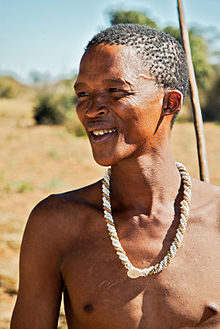Georgiy Starostin
Georgiy Sergeevich "George" Starostin (Russian: Гео́ргий Серге́евич Ста́ростин; born 4 July 1976)[1] is a Russian linguist who presides the Center of Comparative Studies at the Russian State University for the Humanities. He is an active participant of the Santa Fe Institute's Evolution of Human Languages project. He is the son of the late Sergei Anatolyevich Starostin (1953–2005), and carries on several of his father's projects.
Biography
Starostin is the son of the late Sergei Starostin (1953–2005), formerly Russia's leading specialist in comparative linguistics and head of the so-called 'Moscow school' of that field.
Since the early 2000s[citation needed] he has worked at the Center of Comparative Studies at the Russian State University for the Humanities, where he also teaches, as well as serves as head of the Department of Far Eastern Philology at the same institution; specializing in Dravidian, general Nostratic, Sino-Tibetan (mainly Chinese), Yenisseian, and Khoisan studies.[2] He carries on several of his father's projects, including the participation at the Santa Fe Institute.[3]
With John Bengtson, Starostin edited the journal Mother Tongue in 2003.[citation needed] He is also a music blogger.[4]
Work
Starostin's research focuses on the Evolution of Human Languages project;[5] The Tower of Babel, a publicly searchable online database containing information about many Eurasia's language families;[6][7] and STARLING, a software package to aid comparative linguists.[2][8]
Evolution of Human Languages

The Evolution of Human Languages (EHL) is an international project on "the linguistic prehistory of humanity" coordinated by the Santa Fe Institute. The project distinguishes about 6000 languages spoken in the world nowadays, and aims to provide a detailed classification similar to the accepted classification of biological species.
Their idea is that "all representatives of the species Homo sapiens presumably share a common origin, [so] it would be natural to suppose - although this is a goal yet to be achieved - that all human languages also go back to some common source. Most existing classifications, however, do not go beyond some 300-400 language families that are relatively easy to discern. This restriction has natural reasons: languages must have been spoken and constantly evolving for at least 40,000 years (and quite probably more), while any two languages separated from a common source inevitably lose almost all superficially common features after some 6,000-7,000 years".[9]
George Starostin's research here focuses on the Khoisan, formerly, Bushman-Hottentot languages of South Africa. According to Starostin "important work on Khoisan languages has been done in the past century, mostly in the descriptive and taxonomic area, not much progress has been achieved in establishing regular phonological correspondences between the main branches of Khoisan and reconstructing the phonological and morphological system of Proto-Khoisan."[10]
Tower of Babel project

The Tower of Babel is an International Etymological Database Project coordinated by the Center of Comparative Linguistics of the Russian State University of the Humanities. The project aims to "join efforts in the research of long range connections between established language families of the world. The Internet is used to combine these attempts and to build up a commonly accessible database of roots, or etyma reconstructed for the World's major (and minor) linguistic stocks."[11]
Starling database program
The Starling database program is part of the Tower of Babel project. This software program developed by Starostin aims to support "various types of linguistic text and database processing, including handling of linguistic fonts in the DOS and WINDOWS operating systems, operations with linguistic databases and Internet presentation of linguistic data".[12]
Publications
This article's use of external links may not follow Wikipedia's policies or guidelines. (April 2017) |
Starostin has written a number of articles on Dravidian, Yeniseian, Khoisan, and language isolates. A selection:[13]
- 1995, "The Structure of the Ket Verbal Form", with KY Reshetnikov, in: Ket Volume, issue 4 (1995, Moscow). (Russian language)
- 1995, "The Morphology of the Kott Verb and the Reconstruction of the Proto-Yenisseian Verbal System", in: Ket Volume, issue 4 (1995, Moscow). (Russian language)
- 1997, "Alveolar Consonants in Proto-Dravidian: One or More?", in: "Proceedings on South Asian Languages" (July 1–4, 1997), Moscow .
- 2002, "On The Genetic Affiliation Of The Elamite Language", in: Mother Tongue, Vol. 7, 2002.
- 2003, "A lexicostatistical approach towards reconstructing Proto-Khoisan", in: Mother Tongue, Vol. 8, 2003.
- 2005, "Some Aspects Of The Historical Development Of Clicks In Khoisan Languages", in: "Aspects of Comparative Linguistics", v. 1 (2005, Moscow, RSUH Publishers). (Russian language)
- 2008, "From modern Khoisan languages to Proto-Khoisan: The value of intermediate reconstructions" (originally in: Aspects of Comparative Linguistics 3 (2008), 337-470, Moscow: RSUH Publishers)
References
- ^ Introduction: Stuff About Me
- ^ a b FAQs of The Tower of Babel project at Starling.rinet.ru
- ^ Evolution of Human Languages: Reconstruction of Proto-Khoisan Starostin's homepage at Santa Fe Institute. retrieved 24 October 2007
- ^ Kilroy, Dana Sullivan (21 August 2015). "Trickster -- When Is Music Fandom Pathological?". Medium. Retrieved 6 March 2016.
- ^ Linguists seek a time when we spoke as one, by Moises Velasquez-Manoff, USA Today, 20 July 2007. This recent article in USA Today discussed the Human Languages project.
- ^ The Tower of Babel: Evolution of Human Languages Project, at Tower of Babel site
- ^ The Tower of Babel: Evolution of Human Languages Main Page at Santa Fe Institute
- ^ The STARLING Database Program at Tower of Babel site
- ^ "Evolution of Human Languages - An Introduction" at Santafe.edu, retrieved 25 October 2007. New link, see here. Accessed Oct 27, 2009.
- ^ "Khoisan Research Focus Area" at Santafe.edu, retrieved 25 October 2007.
- ^ The Tower of Babel project. at Starling.rinet.ru, retrieved 25 October 2007.
- ^ STARLING project at Starling.rinet.ru., retrieved 25 October 2007.
- ^ For an overview of further work in his Tower of Babel project, see The Tower of Babel Electronic Library.
External links
- Webpage about Georgiy Starostin at the Santa Fe Institute.
- Only Solitaire: George Starostin's music reviews at Starling.rinet.ru.
- George Starostin's current music reviews blog
- Notes on the Moscow Conference on Long-Range Comparison
